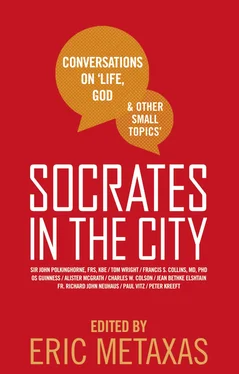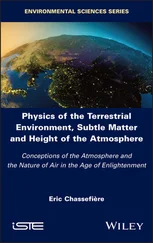I have to say that I’m surprised that particularly as a top physicist, Dr. Polkinghorne would have been so naive as to believe that someone might have actually knocked him over with a feather— even a very, very, very large feather. One from an emu or ostrich, perhaps, would hardly be able to knock over an average-sized adult male, even if he were temporarily stunned by his appointment to the presidency of a Cambridge college. As I say, even I, as a non-physicist, who got a 1 on his AP exam, know that, and I am embarrassed to report that Dr. Polkinghorne, with all his fancy degrees and honors, somehow did not know that.
Given Dr. Polkinghorne’s weight and any reasonable μ [“mu”] friction coefficient, I think the idea of his being knocked over by a feather is patently and demonstrably absurd. But I’m sure that by now, he has repented of the statement.
In any case, Dr. Polkinghorne retired as president of Queens College in 1996. He is a member of the General Synod of the Church of England and of the Medical Ethics Committee of the British Medical Association.
He was appointed KBE— Knight Commander of the Order of the British Empire— in 1997. Now, a word to the wise: I am told that like many knights, Sir John is handy with a broadax, and if you aren’t in full agreement with his talk tonight, he might very well be forced to smite you or cleave you, as the case may be.
As most of us know, Dr. Polkinghorne has published a series of remarkable books on the compatibility of religion and science. These began with The Way the World Is. He said, “It was what I would have liked to have said to my scientific colleagues who couldn’t understand why I was being ordained.” The Way the World Is is available on our book table. It’s a fabulous book.
Just last year, Dr. Polkinghorne won the prestigious— very prestigious— Templeton Prize for progress in religion. The award has previously been awarded to such figures as Mother Teresa and Alexander Solzhenitsyn. Contrary to popular belief, it has never been awarded to Sir Elton John or to Sting. Glad to clear that up for some of you.
So, let me say then what a pleasure it is now to welcome to this podium at Socrates in the City— Sir John Polkinghorne.
Talk
Oh, dear, what an act to follow. Let me say, I’m very pleased to be here to try to stumble along in Eric’s wake.
You gather that I am someone who wants to take science absolutely seriously, and I think that we are right to do so in this age of science. I am also someone who wants to take religion, particularly my own religion, Christianity, absolutely seriously as well. I believe that I can do that, not, of course, without puzzles occasionally, but without intellectual dishonesty and, indeed, with some degree of mutual enhancement, because it seems to me that science and religion have one extremely important thing in common— they both are concerned with the search for truth.
The question of truth is as important to religion as it is to science. Religion can do all sorts of things for you. It can comfort you in life and in death, but it cannot do any of those things unless it is actually true. Of course, science and religion are looking for different aspects of the truth.
Science has purchased its very great success by the modesty of its ambition. Science does not seek to ask and answer every sort of question. It restricts itself essentially to asking questions of process, which are “how questions” of how things come to be. It also restricts the kind of experience that it takes into account in framing and finding its answers to those questions. Science treats the world as an object, as an it, as something that you can put to the experimental test, that you can pull apart to see what it is made of, and we have learned all sorts of very significant things by doing that.
We also all know that there is a whole realm of human experience— personal experience— and, I would wish to add, the chance personal experience of encounter with the sacred reality of God, a realm of experience in which testing has to give way to trusting. If I’m always setting little traps to see if you are my friend, I would destroy the possibility of friendship between us. Religion is asking a different set of questions, deeper questions, and, in my view, more interesting questions, even than those of science— questions of meaning and purpose: “Is there something going on in what is happening in the world?”
So, there are lots of questions, it seems to me, that are necessary to ask and meaningful to ask, but which are just not scientific questions in their character and, therefore, are questions which science by itself is unable to answer. Interestingly enough, some of those questions arise from our experience of doing science but take us beyond science’s self-limited power of inquiry. You might call them meta-questions — questions that take us beyond.
I want to start by considering briefly with you two of those meta-questions, and the first one is this. It’s a very simple question, so simple, in fact, that most of the time, we don’t even stop to think about it, but I think it’s worth thinking about. It is simply this: Why is science possible at all? In other words, why can we understand the physical world in which we live?
“Well,” you might say, “that’s pretty obvious. We’ve got to survive in the world. If we don’t understand the world, we’ll soon come a cropper [British term meaning ‘run into trouble’].”
Of course, that’s true up to a point. It is true of everyday knowledge and everyday experience. If we couldn’t figure out that it’s a bad idea to step off the top of a high cliff, then we would not stay around for very long. We would stay around a bit longer in my part of the world, which is extremely flat. Nevertheless, we would obviously come to grief.
But it does not follow from that everyday practicality that somebody like Isaac Newton can come along and, in a quite astonishing, imaginative leap, see that the same force that makes the high cliff dangerous is also the force that holds the moon in its orbit around the Earth and the Earth in its orbit around the sun and discover the mathematically beautiful law of universal inverse square or gravity, and in terms of that can explain the behavior of the whole solar system. Of course, back two hundred years after Newton, Einstein comes along and discovers general relativity, which is the modern theory of gravity; then, in terms of that, he is able to explain not just our little local solar system but to frame the first genuinely scientific cosmology account of the whole universe. Incidentally, he got it wrong, but that is another story.
So, why do we have this amazing power? I worked in quantum physics, in small-particle physics, the smallest bits of matter, and the quantum world is totally different from the everyday world. In the quantum world, if you know where something is, you don’t know what it’s doing. If you know what it’s doing, you don’t know where it is. That’s the high-and-low of Heisenberg’s uncertainty principle in a nutshell. That world is totally different from the everyday world, and if we are to understand it, we have to think differently about it. But we have learned how to do that. We have powers to understand the world that greatly exceed anything that could be considered as just a survival necessity, just a mundane necessity, or, indeed, be considered as some happy additional spin-off from necessities of that kind.
I don’t know whether you are a Sherlock Holmes fan, but I hope you might be, and if you are, you will remember that when Holmes and Watson first meet each other, they’re having breakfast in a London hotel, and right from the start, Holmes is pulling Watson’s leg. He says to Watson, “I don’t know, I don’t know. Does the earth go around the sun? Or does the sun go around the earth?” The good doctor is horrified at this deplorable scientific ignorance, and Holmes just says, “Well, what does it matter for my daily work as a detective?” It doesn’t matter at all, but we all know many, many things. Science has told us many, many things that are actually intellectually satisfying to know and that are certainly not connected with the certainties of everyday life.
Читать дальше











